 Petzlover
PetzloverDogo Cubano is originated from Cuba but Miniature Australian Shepherd is originated from United States. Dogo Cubano may grow 9 cm / 4 inches higher than Miniature Australian Shepherd. Dogo Cubano may weigh 30 kg / 67 pounds more than Miniature Australian Shepherd. Dogo Cubano may live 3 years less than Miniature Australian Shepherd. Both Dogo Cubano and Miniature Australian Shepherd has almost same litter size. Dogo Cubano requires Low Maintenance. But Miniature Australian Shepherd requires Moderate Maintenance
The Cuban Mastiff which came from Cuba, was developed from breeds of Mastiffs, Bulldogs and cattle dogs, with the breed being thought to be extinct since the end of the 19th century.
The Dogo Cubano had a number of roles to fulfill in its day and they were used for guarding stock, for dog fighting and for chasing runaway slaves. After the abolishment of slavery, the large dog had no real role and it died out.
Known also as the Cuban Mastiff or Mastin de Cuba, there isn’t much accuracy as to its origins, with the most common story for their origin being that they are descendants of the Molossus.
The dogs were later introduced into Western Europe, becoming fairly common in England and Spain. The dog was also was also mentioned in the works of canine authors Stonehenge and George Wood.
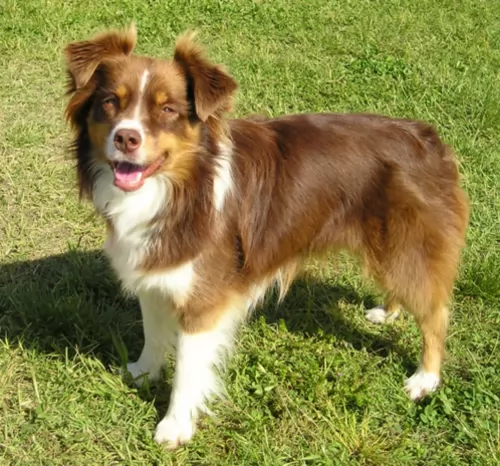 Unlike some miniaturized pure dog breeds, the Miniature Australian Shepherd is a breed of its own. The American Kennel Club and the United Kennel Club recognize that the miniature Australian Shepherd is the same as the miniature American Shepherd.
Unlike some miniaturized pure dog breeds, the Miniature Australian Shepherd is a breed of its own. The American Kennel Club and the United Kennel Club recognize that the miniature Australian Shepherd is the same as the miniature American Shepherd.
Certain breeding programs to develop the Miniature Australian Shepherd have been established and this dog is a small version of the Australian Shepherd. You can say that the Mini Australian Shepherd was developed in the 1960s and hails from the USA. American ranchers bred small Australian Shepherd dogs to create smaller replicas of the breed.
The Dogo Cubano was generally similar to other Mastiffs and stood at rough 48 – 55cm in height and weighing in the region of 45kg.
He was a large dog, powerfully built, muscular and strong. Images of the dog show that it had strong, straight legs with a long tapering tail and medium-sized floppy ears that were sometimes cropped upwards and close to the head.
The dog breed came in a variety of colors such as brown, tan, fawn and brindle. The muzzle was broad and short and black. The dog had pronounced jowls with its face being fairly wrinkly.
This large dog was known for being a courageous, independent and aggressive dog. He became attached to his owner, showing protective characteristics .In those days the dog would have received simple training and certainly if such a large dog still existed today, it would have to receive training and socialization as well.
The Dogo Cubano was an intelligent dog and easily trainable, requiring an owner with a firm hand. Being an aggressive breed, the dog possibly wouldn’t have been the best companion for children. He also wouldn’t have got on too well with pets in the home as he was trained to be a fighter in his day. Independent and strong-willed, the dog would not have suited a novice dog owner.
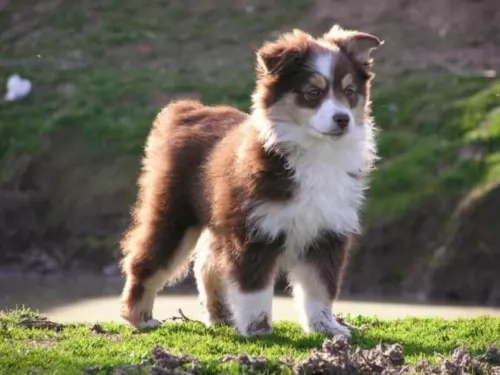 The Miniature Australian Shepherd’s coat is medium-length and is straight or wavy. It comes in a range of colors such as blue or red merle and red or black tricolor. There are white or tan markings as well. He is a small dog, standing at 33 - 46 cm in height and weighing 6 – 16kg.
The Miniature Australian Shepherd’s coat is medium-length and is straight or wavy. It comes in a range of colors such as blue or red merle and red or black tricolor. There are white or tan markings as well. He is a small dog, standing at 33 - 46 cm in height and weighing 6 – 16kg.
They have blue or brown eyes but some will even have one eye blue and the other brown. The ears are semi erect, semi floppy and the tail, while essentially left long and feathery, is sometimes docked.
Miniature Australian Shepherds are easygoing dogs who love being with their human families. They get on well with children in the home and are always willing to jump right in for a game.
They’re lively and agile and if its not games they’re busy with, they want to be on a walk. They’re loving and loyal and also eager to please, sensing what their owner wants.
They’re intelligent dogs too and easy to train so it is sure to go well with training and socialization, which is important for any dog. This training and socialization can actually help with problems a dog has such as being very nervous or being too active indoors. They become obedient and manageable wherever they are.
He is also willing to get on with other pets in the house. Just like the larger dog, the mini Australian Shepherd loves to be active and at work.
The Dogo Cubano was bred to be a guard dog as well as for dog fighting, but this large dog, with training and socialization, no doubt became a loyal and devoted family pet.
It was actually a social dog, being aggressive towards other dogs. He would be described as a dog better suited to a home with older children.
He was protective with his human family but not very active, being too big to be leaping around like other dog breeds. It is a pity that this large dog has disappeared as he had some good qualities.
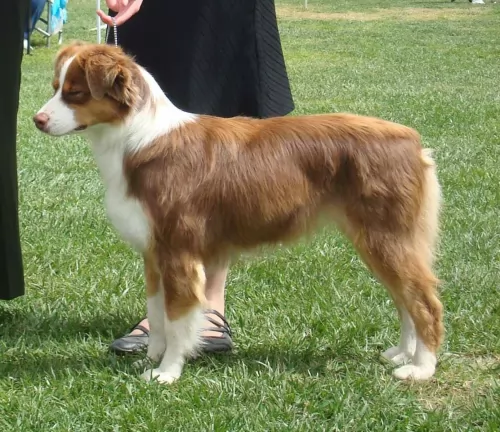 The wonderful friendly nature’s of these dogs make them excellent family pets, especially when they have been trained and socialized. They can live in the city or country but they will certainly require being exercised as they are an active breed, wanting to be busy with his human family.
The wonderful friendly nature’s of these dogs make them excellent family pets, especially when they have been trained and socialized. They can live in the city or country but they will certainly require being exercised as they are an active breed, wanting to be busy with his human family.
You can’t describe these dogs as low maintenance as they have long, thick hair that sheds and which will also need to be brushed regularly.
If you’re able to provide a good home for this beautiful, lively dog, then he will make you a splendid pet.
The Dogo Cubano was a generally healthy breed, but just like with most other dog breeds, they were also prone to some of the more common dog problems. The chances of him getting sick were slim though.
When the dog first originated, there were unlikely to have been health clearance certificates, but today, you’d want health clearances from the Orthopedic Foundation for Animals.
The reason for this is that hip dysplasia is a heritable condition, seen more often in large dogs, where the thigh bone doesn’t fit into the hip joint properly. The dog suffers with pain and discomfort and the condition can lead to lameness with the dog.
Gastric Torsion or Bloat is a life threatening condition that affects large dogs like the Dogo Cubano and those with deep chests. The stomach is distended with gas and it can twist.
The gas can’t escape and blood flow is hindered. The dog vomits, is lethargic and weak, and immediate veterinary help will be required.
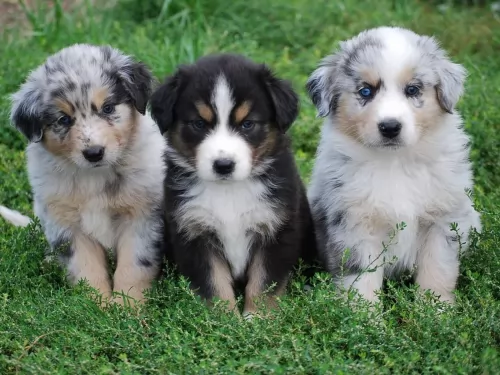 Your Miniature Australian Shepherd can enjoy good health if you make sure he has a nutritious diet, he is well exercised and he is happy and content because of the attention you give him. He can easily reach 13 years of age.
Your Miniature Australian Shepherd can enjoy good health if you make sure he has a nutritious diet, he is well exercised and he is happy and content because of the attention you give him. He can easily reach 13 years of age.
Also, say what you like, human beings constantly tampering with animals to produce certain looks has its drawbacks and can create health problems in dogs.
As a pure breed however, these dogs will be more susceptible to some common canine health problems such as hypothyroidism, patellar luxation, obesity, hip dysplasia, vision problems and cancer.
The Dogo Cubano was a large dog, so if he did become used to living in the city, he would have adapted better to life in the country.
He wasn’t a dog requiring too much exercise but he would have needed to go for walks. They were used as guard dogs long ago, and if he had been in existence today, you wouldn’t have been able to include him in your jogging and cycling as he was a dog that could easily overheat.
Not all dogs require the same amount of food. Long ago the Dogo Cubano wouldn’t have had the same variety of dog foods available today. Maybe the dog in those days was fed the same kind of food that his owner ate.
Today, if these dogs were still around, they would require the best quality ‘large dog breed’ kibble.
The better the dog food, the more nourishing it is and the healthier the dog is. The Dog Cubano would likely have been a dog that drooled, leaving quite a bit of backwash in the water bowl, so it would have been important to wash out the drinking bowl and to regularly replace it with cool, fresh water.
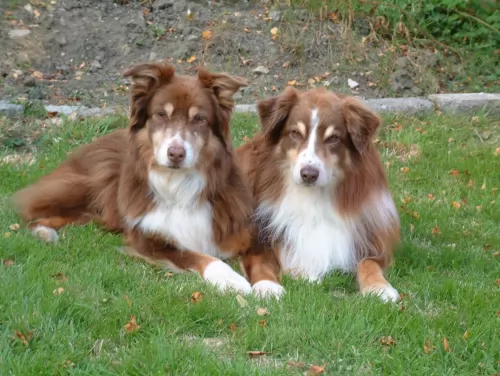 The mini Australian Shepherd has a long coat with seasonal shedding. You will need to give the coat a good brush twice a week to keep it untangled and to remove loose hair.
The mini Australian Shepherd has a long coat with seasonal shedding. You will need to give the coat a good brush twice a week to keep it untangled and to remove loose hair.
Other grooming for your pet will be to check his eyes and ears for infection, check for unusual lumps when you brush him and check for fleas and ticks. Keep his nails trimmed and brush his teeth 2 or 3 times a week to avoid plaque build up.
If you’re wondering how to keep your dog well groomed for the enhancement of this health, people such as your vet or professional groomers will do these grooming tasks for you.
Top quality commercially manufactured dog food packed with vitamins and minerals needs to be your choice if you're going to be using these dog foods. Avoid the cheaper brands that use lots of fillers, sugar, salt, colorants and preservatives.
Home-made food is a wonderful treat for a dog and delicious, nutritious and simple ingredients such as boiled chicken, brown rice or pasta and some cooked vegetables chopped up into his dry kibble from time to time will do him wonders.
Sometimes it will also be good to add in a little bit of raw meat too. Make sure there is a bowl of fresh, cool water available to your pet constantly.